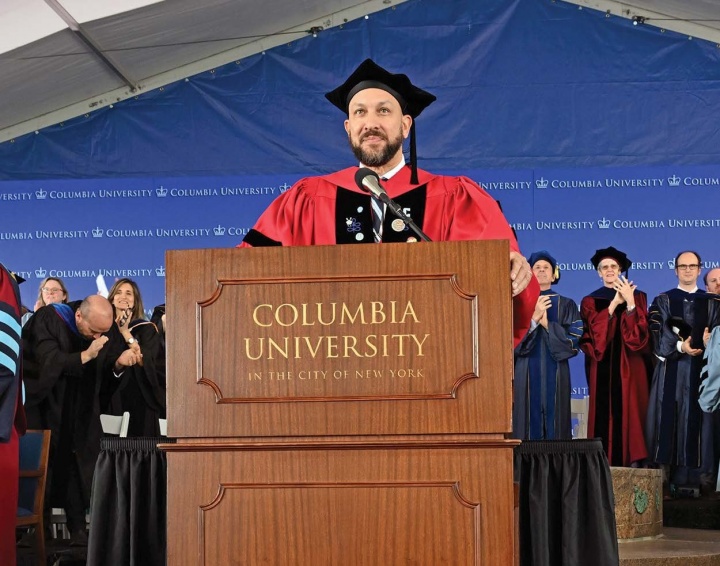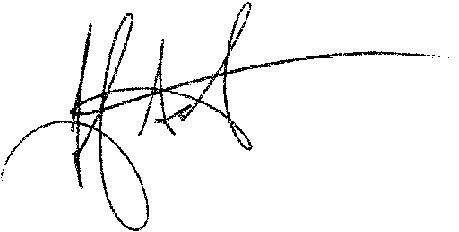Columbia College | Columbia University in the City of New York
“Make Space for Beauty”

EILEEN BARROSO
To bring to a close
What is to do
What is to happen
Appropriate to an occasion that is an end and a beginning at once, the above poem was penned by Korean-American poet Myung Mi Kim. “Lamenta 502” is taken from her 2002 book, Commons, which appears on the syllabus for Literature Humanities, a key part of your first year at Columbia.
Lit Hum is part of your unique heritage as Columbia College students; that is, the Core Curriculum and the rich tradition of liberal arts education it represents. You have developed habits of mind that will serve you for a lifetime, enabling you to interrogate and understand the world around you. Your majors and concentrations in the arts and sciences have deepened your knowledge and expertise. And, if we did our jobs right, the way you see the world has evolved, and you are graduating today motivated by the belief that you have the power — and obligation — to change it for the better.
The work of W.E.B. Du Bois is an important touchstone for me in this regard. Perhaps some of you will recall this passage from your time in Contemporary Civilization. In his 1903 classic, The Souls of Black Folks, Du Bois wrote the following: “The function of the university is not simply to teach breadwinning, or to furnish teachers for the public schools, or to be a center of polite society; it is, above all, to be the organ of that fine adjustment between real life and the growing knowledge of life, an adjustment which forms the secret of civilization.”
In this next phase of your life, the responsibilities you confront will often be ones you choose and define: your professional path, your family life and the communities you claim and that claim you. Others will exceed, or even frustrate, your choices and plans. In all of these instances — no matter what shape or form they take — you will have the opportunity to bring what you have learned to bear as you take action. Put another way, as current and future leaders, you will have the chance — and the responsibility — to uphold the values you cherish and to add value to the world around you. You will no doubt do well for yourselves. You are Lions, after all. Yet I exhort you to also do good, as complicated and naive as these two simple words might be.
In a 1993 interview with The Paris Review, the late novelist and Nobel Laureate Toni Morrison, whom you read in Literature Humanities, shared the following: “I think of beauty as an absolute necessity ... I think it’s almost like knowledge, which is to say, it’s what we’re born for ... .”
It is in that spirit that I want to impart a final thought — a charge, if you will. Amidst the pressures and complications that will confront you in the years to come, and in the face of the ugliness that can intrude in our society, make space for beauty in your life. Help cultivate it in others and sustain spaces for it to flourish, as much as you are able. And take an expansive view of the places, things and people to which you ascribe beauty.
It can be found everywhere. In the arts to be sure — where your shared grounding in the humanities will serve you for a lifetime — but also in simple human interaction, in the routines of daily life, in your neighborhood, the workplace, in relationships and in the context of communities of every kind that surround you.
There is a kind of ordinary activism to be found in apprehending and amplifying the beauty around you. Seeking it, discerning it and striving to name it will enrich your lives, and the lives of those within — but also those beyond — your reach. Beauty is the great hope for our shared present and futures.
Each of you is now on a threshold; what’s next beckons. The great works, struggles and joys of the years ahead are waiting for you, but you’re not there yet. This time — the in-betweenness of it — can feel strange, and that is as it should be. You are embarking on the process of defining your place in a world that is often turbulent and unsettled. And that world calls out for your voice, for your ideas and for your energy. Trust yourself. Trust the questions that drove you as a student. Trust the sparks that ignite your interests and passions. Trust the impulse to ascertain what and where the good is. Trust beauty wherever you find it, and make beauty wherever you find yourself. And trust the hope it represents.
Your Columbia College education has imbued you with the skills to think critically, learn, debate and innovate. It is now your responsibility to use these tools in the service of building and leading a more beautiful world.

Josef Sorett
Dean of Columbia College and the Henry L. and Lucy G. Moses Professor Vice President for Undergraduate Education
Professor of Religion and African American & African Diaspora Studies
Issue Contents
Published three times a year by Columbia College for alumni, students, faculty, parents and friends.
Columbia Alumni Center
622 W. 113th St., MC 4530, 6th Fl.
New York, NY 10025
212-851-7852
cct@columbia.edu
Columbia Alumni Center
622 W. 113th St., MC 4530, 4th Fl.
New York, NY 10025
212-851-7488
ccalumni@columbia.edu

